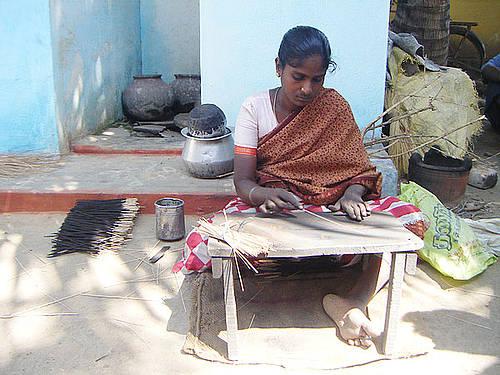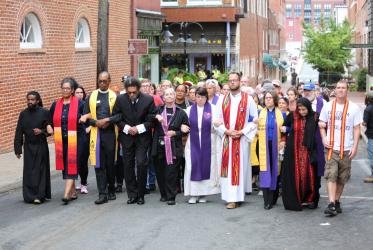Despite having a constitution which does not allow discrimination and a proactive government working for the integration of the marginalized parts of society, violence and discrimination persist in some parts of India.
Members of ECHOS, the World Council of Churches (WCC) commission on Youth, were exposed to the many facets of violence in India during community visits in advance of their recent meetings held in Bangalore 1-10 October 2008.
The 25 members of ECHOS represent a variety of WCC consultative commissions, Central and Executive Committee, the Catholic and Pentecostal Youth and Students Networks as well as regional and global youth organizations, like the World Students Christian Federation (WSCF). Their goal is to facilitate more coherent youth participation within the WCC.
While in India, the group was hosted by the Student Christian Movement in India (SCMI), who helped them learn more about experiences of violence among young adults living in various situations.
At the "Centre for Rural Health and Social Education" in the Yelagiri Hills, 140 km from Bangalore, director Benjamin Bennett introduced the group to the situation of the now so called "scheduled tribes" and "scheduled castes" (otherwise known as "untouchables").
Coming from all over the world, the ECHOS members are used to the conditions of poverty and social injustice, but confronted with the Indian caste system they experienced injustice in a different way.
The implementation of the constitutional mores has proven challenging for the Indian government according to some ECHOS members who visited Dalit villages in the Tamil Nadu region.
The women of "Semparuthi - Women Self Help Group" can get micro credit to start an incense business, a group member said. For example, a woman can earn 100 rupees a month for rolling 3'000 thousand incense sticks. It takes about 10 hours to complete the task. But the sense of the ECHOS team was that "these governmental programmes are put upon these people. The programmes alone do not have the power to change the structural problems which are too much intertwined with culture and religion."
The ECHOS team was interested in the churches' response towards the structural violence in India. "At the moment, our churches are also victims of violence", says Rev. Florence Deenadayalan, one of the first two ordained women ministers of the Church of South India.
"Because of the recent attacks towards priests in Bangalore, I'm advised not to wear my clericals in the streets," Deenadayalan said. "The aggressions from Hindu groups are reactions towards the public judgments of evangelical churches against Hindu culture. Before these groups were becoming so strong by the financial support mainly of churches in the US, we never had these kinds of problems."
In light of the recent violent attacks on Christians in India, four young theologians shared their perspectives on the nature of the violence there.
Vineeth Koshy, Youth Secretary of the Indian National Council of Churches, addressed religious violence by saying that "the origin of many religious conflicts is that one compares ones's own ideal religion against others' real religion, leading to differences, complexities, distortions and enmity."
Ainita Lebsibah, a member of SCMI and a student at Tamil Nadu Theological Seminary spoke on violence and the caste system. "Changing faith doesn't change social conditions. The churches in India are being called to breathe new life in the social empowerment of the Dalits and the Tribals."
The caste system has an especially devastating impact on women in India. "Ninety-five percent of all abortions in the country are female fetuses", says Latha Paul, General Secretary of the local YWCA. Paul says, "traditional attitudes towards gender roles need to be addressed by educating young women and men. Ecumenical formation can play an important role in this education."
Speaking on the topic of economic justice, Lukasz Nazarko, member of ECHOS and the Commission of the Churches on International affairs (CCIA) stated that "economic violence occurs in all other kinds of violence - religious, caste and gender, which can be witnessed in many of the social problems in India."
For the ECHOS team there was a connection between what they saw in India and the study process of the WCC decade-long initiative, the Decade to Overcome Violence.
"Youth can play an important role in overcoming structural violence like racial separation and class divisions, because they did not take part in creating or maintaining them", says Itayi Ndudzo, from the Methodist Church in Zimbabwe and member of the WCC Central Committee.
Jec Borlado of the Baptist Church of the Philippines says: "Constantly and with energy and passion young people are asking about the future as they are still looking forward towards the larger part of their lives. They can contribute with new perspectives on old problems with a special concern about new types of violence, which is mostly impacting their generation, like violence in the media and communication technology."
As the ECHOS teams continued to meet at the Ecumenical Christian Centre outside of Bangalore, together with the WCC's Commission on World Mission and Evangelism, they delved deeper into how young Christians can provide insight and fresh ideas to WCC's mission programmes.
More on the Echos - Commission on youth in the ecumenical movement
Recent statement of the WCC's executive committee on violence and intolerance in India










